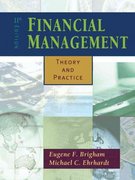

Sora Industries has 60 million outstanding shares, $120 million in debt, $40 million in cash, and the following projected free cash flow for the next four years: a. Suppose Sora's revenue and free cash flow are expected to grow at a 5.0% rate beyond year four. If Sora's weighted average cost of capital is 10.0%, what is the value of Sora stock based on this information? b. Sora's cost of goods sold was assumed to be 67% of sales. If its cost of goods sold is actually 70% of sales, how would the estimate of the stock's value change? c. Return to the assumptions of part (a) and suppose Sora can maintain its cost of goods sold at 67% of sales. However, the firm reduces its selling, general, and administrative expenses from 20% of sales to 16% of sales. What stock price would you estimate now? (Assume no other expenses, except taxes, are affected.) d. Sora's net working capital needs were estimated to be 18% of sales (their current level in year zero). If Sora can reduce this requirement to 12% of sales starting in year 1, but all other assumptions are as in (a), what stock price do you estimate for Sora? (Hint: This change will have the largest impact on Sora's free cash flow in year 1.) a. Suppose Sora's revenue and free cash flow are expected to grow at a 5.0% rate beyond year four. If Sora's weighted average cost of capital is 10.0%, what is the value of Sora stock based on this information? The stock price for this case is $ (Round to the nearest cent.) (Click on the following icon in order to copy its contents into a spreadsheet.) 0 1 2 3 4 433.0 Year Earnings and FCF Forecast ($ million) 1 Sales 2 Growth vs. Prior Year 3 Cost of Goods Sold 4 Gross Profit 5 Selling, General, & Admin. 6 Depreciation 7 EBIT 8 Less: Income Tax at 25% 9 Plus: Depreciation 10 Less: Capital Expenditures 11 Less: Increase in NWC 12 Free Cash Flow 468.0 8.1% (313.6) 154.4 (93.6) (7.0) 53.8 (13.5) 7.0 (7.7) (6.3) 33.4 516.0 10.3% (345.7) 170.3 (103.2) (7.5) 59.6 (14.9) 7.5 (10.0) (8.6) 33.6 547.0 6.0% (366.5) 180.5 (109.4) (9.0) 62.1 (15.5) 9.0 (9.9) (5.6) 40.1 574.3 5.0% (384.8) 189.5 (114.9) (9.5) 65.2 (16.3) 9.5 (10.4) (4.9) 43.1








